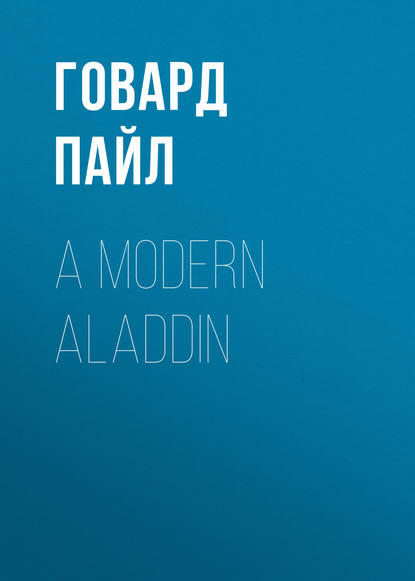По всем вопросам обращайтесь на: info@litportal.ru
(©) 2003-2024.
✖
A Modern Aladdin
Настройки чтения
Размер шрифта
Высота строк
Поля
"Where is the lady who came in the carriage?" he cried, excitedly. "Run, stop her!" He flung the bedclothes off himself and jumped with one bound out upon the floor.
Once again August was startled out of his decorum. "Monseigneur!" Then, recovering himself again: "The lady, monseigneur, is gone."
The gardener, working upon the terrace below, heard the rattle of a window flung violently open, and, upon looking up, was very much surprised to behold Monseigneur the Marquis, still clad in his colored dressing-gown, and with his nightcap thrust tipsily over one side of his head. So the marquis stood looking out of the window staring into space, for he had no more idea who it was that had stopped at the door and had left him a diamond worth twenty-five thousand livres than if he had never been born. "Ha!" thought he; "the letter; it was signed Oliver de Monnière." Thereupon he drew his head in and shut the window again.
Scene Fourth. —The parlor of the house in Flourens
Oliver's mother has returned some little time from the château, and Oliver and she are talking it over between them.
"The marquis will visit us," said Oliver, "within an hour."
"He will do no such thing," said Oliver's mother; "he will not come at all."
"He will," said Oliver, taking out his brand-new watch from his breeches pocket and looking at it – "he will be here within a half an hour."
Oliver's mother sniffed incredulously. Oliver arose from the sofa where he was sitting and went to the window, and there stood drumming upon the sill, looking out into the street. Suddenly he drew back. The rumble of a coach was heard; it stopped before the house. A servant opened the coach door, and monseigneur himself stepped out.
He had driven over from the château, and had stopped at the inn. Pierre was standing at the door-way when the marquis leaned out from the window and beckoned – yes, actually beckoned to him. Pierre was so surprised that he took off not only his hat, but his wig also, and stood there bowing in the sun, with his head glistening like a billiard-ball.
"Do you know, innkeeper, of one Monsieur de Monnière who lives in this neighborhood?"
"Monsieur de Monnière?" repeated Pierre, blankly.
"Yes," said the marquis, impatiently. "De Monnière – Monsieur de Monnière. Do you know where Monsieur de Monnière lives?"
"Monsieur de Monnière," repeated Pierre, stupidly; he did not recognize the name.
The landlady stood in the door of the inn behind: woman are quicker of wit than men. "Monseigneur means Monsieur Oliver," said she.
The marquis overheard. "Yes," exclaimed he. "Monsieur Oliver – Monsieur Oliver de Monnière."
"Oh, Monsieur Oliver!" cried Pierre. "Oh yes, I know him as well as I know myself. He and his respected mother are now living up there on the hill. You can, monseigneur, see the house with your own eyes. It is that one with the white wall to the side, and with the apple and pear trees showing over the top. The rich Dr. Fouchette used to live there. It is, monseigneur, the finest house in Flourens. Monsieur Oliver indeed! That is good! I have known Monsieur Oliver ever since – "
But the coach was gone; the marquis had called out to the driver, had pulled up the window with a click, and now the coach was gone. Pierre stared after it for a while, and then he put on first his wig and then his hat, and went into the house again.
So Oliver drew back from the window and turned around. "You see, mother," said he, "monseigneur comes, as I asserted he would."
Oliver's mother was in a tremendous flutter. "And to think," said she, "of his coming all the way from the château just because of a little piece of cut-glass!"
Oliver laughed. "That little piece of cut-glass was worth having," said he. "You do not yet know the value of little pieces of cut-glass like that, my mother."
Madame Munier did not listen to what Oliver was saying. "And to think," said she, "of Monseigneur the Marquis visiting me, the Widow Munier!"
"You forget, mother," said Oliver. "You are no longer Widow Munier, you are Madame de Monnière."
Henri opened the door. "The Marquis de Flourens," he announced; and the marquis entered the room with his feathered hat and his clouded cane in his hand.
"This is Monsieur Oliver de Monnière?" said he.
Oliver bowed.
"And this lady?"
"Permit me," said Oliver; "my mother."
Madame de Monnière courtesied so low that she nearly sat down upon the floor. She was profoundly agitated; she was frightened; she would rather be somewhere else. She was pleased. Yes, it was delicious having a marquis visit one in one's own house.
"And you, madame," said the marquis, "if I may be permitted to ask, did me the honor of calling upon me this morning?"
Madame de Monnière nodded. She was embarrassed at the thought of what she had done; she could not speak. Oliver spoke for her.
"She obliged me," said he, "by executing a little commission for me. Pardon me, monseigneur, that, knowing your interest as a collector, I took the liberty of sending a small specimen to you. I have your forgiveness?"
"Forgiveness!" exclaimed the marquis. "You ask me to forgive you? My dear child, I cannot accept such a gift. It is too great!"
"Do not speak so," said Oliver. "It is nothing – a trifle."
"Nothing!" cried the marquis; "a trifle! It is worth twenty-five thousand livres."
"What then?" said Oliver. "I have many others. You embarrass me by making so much of such a little thing. Let me beg that you will not refuse to accept of this trifle – as a connoisseur – as a collector of curios – "
"Ah!" said the marquis, "there you touch me – as a connoisseur – as a collector. Well, then, I accept it. But you – you say you have many others like this? – you are also a connoisseur?"
"Yes," said Oliver. "I have been indulging a very considerable taste in that direction for the past year. I think I may say now that I have as fine a collection of diamonds as any in Europe."
"Would that I might be permitted to see them!" said the marquis.
"You shall," said Oliver; "at least some of them. I can show you but a few at present. If you will pardon me for a moment, I will go and bring them."
He was gone, and Madame de Monnière and Monseigneur the Marquis were left alone together. For all this while the poor woman had been sitting dazed and bewildered. The words that had fallen upon her ears had overwhelmed her. That bit of glass – that little bit of cut-glass – was worth twenty-five thousand livres! Twenty-five thousand livres! Monseigneur the Marquis himself had said so! Twenty-five thousand livres! and Oliver had given it to the marquis as a trifle! Twenty-five thousand livres! and she with her own ears had heard Oliver say that he had many more bits of glass like it! Yes, he had gone this very moment to bring them there and show them to the marquis. Twenty-five thousand livres! Was she dreaming or was she waking? Twenty-five thousand livres! She was amazed; she was bewildered; she was stupefied. In the midst of all, the marquis turned to her.
"And you, madame," said he, "why did you not wait this morning, and let me at least thank you for this magnificent gift?"
Madame de Monnière's head was spinning. "Twenty-five thousand livres!" said she.
"Ah, I see," said the marquis. "You are embarrassed at the considerableness of it. It is, indeed, from one point of view, a treasure; but we connoisseurs, madame, we collectors, we frequently exchange these little precious curiosities. It is our habit."
Madame de Monnière rose for a moment to the surface of her bewilderment. "Yes," said she; "that is true;" and thereupon sank again into the gulf. "Twenty-five thousand livres!" she murmured to herself.
Just then Oliver returned. In his hand he carried a small box of curiously-wrought iron. Unlocking it, he raised the lid, removed a layer of cotton, and then, tilting it, emptied upon the table a handful of diamonds, that fell flashing and sparkling like broken fragments of sunlight. One or two of the gems rolled across the table and fell hopping to the floor, but Oliver did not appear to notice them. There was a pause of blank and utter silence. Madame de Monnière herself could not have been more amazed at the sight she beheld than was the Marquis de Flourens. Oliver spread out the gems upon the table with his hand, as though they were so many glass beads.
It was the marquis who broke the silence. "Mon Dieu!" he whispered at last, and fetched a breath so deep that it seemed to come from the pit of his stomach. Then he roused himself. "You have dropped some upon the floor," said he. "I saw them fall." And he would have stooped to find them.
Oliver smiled. "It is of no importance," said he. "Henri will find them by-and-by."
For a while the marquis examined the stones in silence, picking out some of the larger gems, and scrutinizing them closely and critically, one after another. "It is a most magnificent collection, my young friend," said he at last. "I never saw a finer lot of diamonds in my life, excepting the King's."
"Oh, these are but a few," said Oliver. "I am sorry that I have not some of my larger and finer stones to show you."












